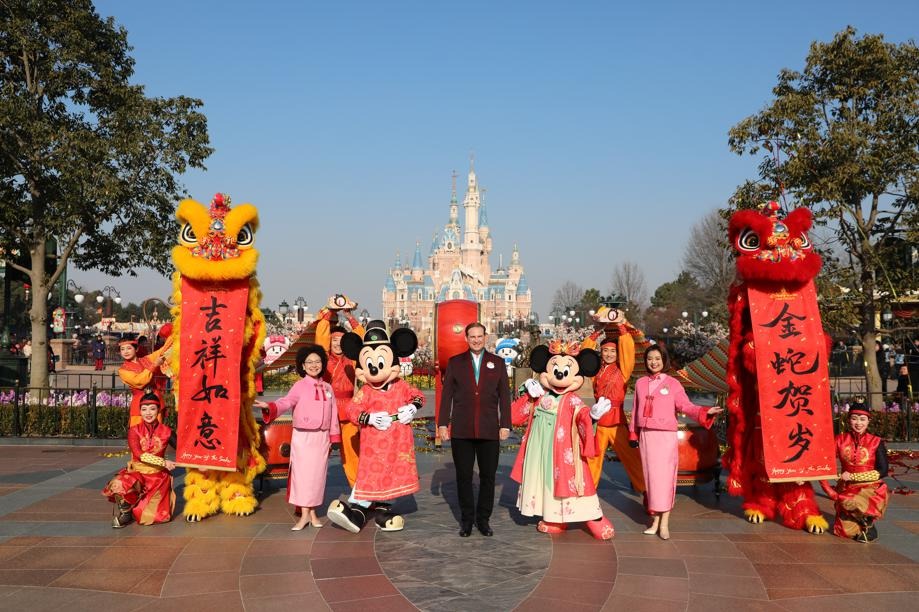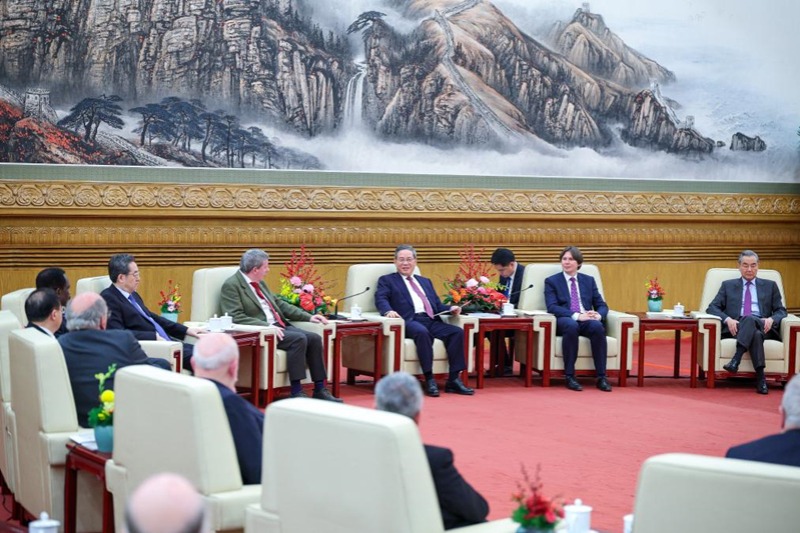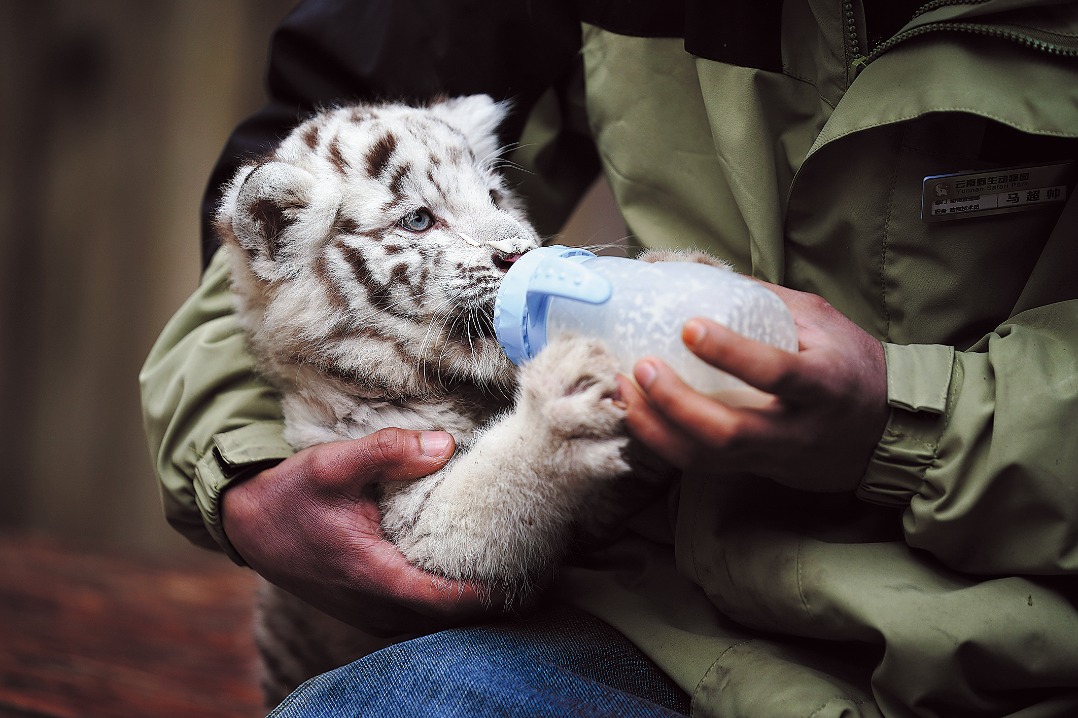Celebrity scandal triggers debate on surrogacy


Case attracts billions of social media views
A surrogacy scandal involving a leading Chinese actress has triggered billions of views on a major social media platform.
The case, which netizens labeled "the most interesting topic to discuss over a cup of tea", centers on Zheng Shuang, 29, who is accused by her ex-boyfriend Zhang Heng of abandoning two children born to surrogate mothers in the United States.
The scandal had attracted more than 20 billion views as of Wednesday on Sina Weibo, with many people voicing shock.
Zhang, who produces the variety show This is Fighting Robots, recently disclosed that he was stranded in the US for over a year because he had to "take care of and protect two young and innocent lives". According to the babies' birth certificates, Zheng is their mother.
In a recorded audio file posted on Jan 18 by Sina Entertainment on Sina Weibo, and believed to be a conversation among Zheng, her parents and Zhang's father, Zheng and her parents expressed their intention to put the two children up for adoption. Zheng also was accused of voicing frustration in another audio file that abortion was not a viable option given that the mothers were seven months pregnant at the time.
After the scandal became public, State-run media, including People's Daily and Xinhua News Agency, strongly condemned the couple's behavior and stressed that surrogate births are prohibited in China.
On Jan 19, the Central Committee of the Communist Youth League of China said in a post on its Sina Weibo account: "China prohibits all kinds of surrogacy. Surrogacy and abandoning children are against social morals and public order …human lives are not toys."
The Commission for Political and Legal Affairs of the Communist Party of China Central Committee said Zheng had taken advantages of legal loopholes and was "definitely not innocent".
On Jan 22, the China Television Artists Association released an announcement on WeChat, stating, "Acting skills are the basis of a career for actors and actresses, while ethics decide fundamentally whether the actors and actresses can be called human."
After Italian luxury fashion house Prada fired Zheng over the scandal, she was stripped of two honorary entertainment titles at home.
In a statement, the Huading Awards Committee said it was retracting Zheng's titles of "Best Actress in a Modern Chinese TV Series at the 19th Huading Awards" and "Popular Top 10 TV Series Star at the 13th Huading Awards".
Hard choice
Among those observing the scandal, Wu Kui-not his real name-is one of few who condemn the abandonment of babies but still take a neutral view on surrogacy. The gay man, who comes from Hebei province but lives in Beijing, is the father of a boy born to a surrogate mother in Thailand. The child is now 2 years old.
"Many people, including Zheng, choose surrogacy to have babies, but hardly any will abandon them. To have a surrogate baby is a hard decision for most people who love children but are unable to have a child themselves. They will treasure the baby like ordinary parents," Wu said.
He and his partner, who have been together for 13 years, decided to have a child in 2016, when Wu was age 38.
Wu said the decision was made because the couple love children and wanted to have a child of their own "like ordinary parents", and not to merely satisfy their own parents or for support in old age.
The couple turned to surrogacy, which although prohibited in China, is legal in countries such as Ukraine, Vietnam and the US.
Having a surrogate child is not cheap-the baby cost the couple more than 600,000 yuan ($92,640). To raise the money, they sold an apartment in Beijing.
"Now, you have to pay more for a surrogate baby," Wu said.
The couple, who viewed an album listing the background information of more than 100 potential surrogate mothers, were drawn to a woman from Ukraine.
"She has two children, leads a healthy lifestyle and grew up in a loving family. That's what we cared about most. She also has a cheerful personality," Wu said.
He and his partner not only faced high fees to have the baby, but also anxiety about possible failure.
"The embryo does not always successfully grow once placed in the uterus. If you want a higher success rate, the US is the best destination for surrogacy," he said.
New regulations
In China, surrogacy is not mentioned in the Criminal Law. However, in 2001, the National Health Commission (formerly the Ministry of Health) issued Regulations on the Assisted Reproductive Technology, which prohibit medical facilities and professionals from performing any form of surrogacy.
The trading of sperm, ova, zygotes (a type of cell) and embryos is also prohibited. Medical institutions can be fined up to 30,000 yuan for violations, according to the regulations.
Chai Xiaofeng, a lawyer from Shanghai, said: "People involved in surrogacy will be suspected of fraud or false imprisonment. We have no specific rules banning individuals or agencies from commissioning or providing surrogacy services.
"Zheng's scandal sheds light on a worrying legal gray area. Although surrogacy is illegal in China, those who pay for such services in countries where it is allowed are not held accountable by Chinese law."
A rising number of wealthy Chinese have taken advantage of this situation by seeking surrogacy services in countries where the procedure is legal and performed under the correct conditions.
Wu said, "The agency we dealt with told me the number of surrogacy requests it receives from gay couples only accounts for 15 percent to 20 percent of the total. Most clients are people with infertility problems-resulting, for example, from the loss of a uterus due to cancer, or the fact that the would-be mother is too old to have a child."
He said the top three surrogacy destinations for Chinese clients are the US, Vietnam and Ukraine.
The US, which has the world's best assisted reproductive technology, also charges the highest fees, which average about 1 million yuan, while in Thailand and Vietnam, surrogacy costs 600,000 yuan to 800,000 yuan.
In Ukraine, such services are comparatively cheap, costing 400,000 yuan to 600,000 yuan. According to a report by the South China Morning Post in June, industry insiders estimate that 2,500 to 3,000 babies are born each year through surrogacy in Ukraine. Of these, one-third are for Chinese clients.
Infertility problems and increased desire for a second child among middle-aged Chinese families are reportedly fueling the demand for surrogacy.
According to the World Health Organization, 10 percent to 20 percent of the global population is infertile, which in China translates to some 15 million couples. Since the country relaxed the one-child policy in 2015, more than half the women among couples eligible to have a second child have been 35 or older, according to the National Health Commission.
Geng Linlin, an expert from the commission's Scientific and Technology Research Institute, said: "Fertility declines as women age. Nearly 90 percent of women age 45 and older are unable to conceive or carry a pregnancy to full term."
With demand for surrogacy rising in China in recent years, calls have been made for the ban to be eased.
In an earlier interview with China Daily, Wang Lina, an experienced fertility specialist at Peking University Third Hospital in Beijing, suggested the government should relax the prohibition to help women have a child.
As volunteer and commercial surrogacy is allowed in many countries, she said China should follow suit.
"However, purely commercial programs must be strictly prohibited," said Wang, who has treated many young women who have had their ovaries removed due to diseases such as cancer. "These women shouldn't miss the chance of having their own child. Surrogacy can help them fulfill their dreams of motherhood," she said.
Wang Guisong, associate professor at Renmin University of China Law School, said no investigations have been carried out to assess the scale of the gray market for surrogacy in China, but demand is clearly booming due to infertility and improving economic conditions.
"The government should face this problem at an early stage by decriminalizing surrogacy and developing policies to legalize it for infertile Chinese couples," he said.
Services booming
Netizen "Fire Balloon", commenting on Sina Weibo on the scandal involving actress Zheng, said: "If surrogacy is allowed, it's highly likely that some poor women will make their uterus a 'production tool' that can be rented. Also, more young girls might sell their eggs to make money."
Beijing News recently reported that underground surrogacy services in China have boomed in recent years. An insider confirmed that in Guangdong province alone, more than 1,000 surrogacy agencies have emerged in the past four years. Fees charged for a surrogate baby range from 200,000 yuan to 700,000 yuan.
The lack of regulation for this underground industry in China means there is little protection for surrogate mothers and babies.
The Beijing News report said many surrogate mothers are kept in basements and only allowed a limited time for outdoor activities. There are also disputes over unwanted babies from time to time.
Ye Hongyu, a feminism and gender equality researcher at China Women's University, said: "Previous research reports found that many women chose to be surrogate mothers to earn money and improve their standard of living. In most cases, they are not told about the potential risks in surrogacy, such as mishaps during pregnancy."
One couple was recently reported to have canceled an agreement with a surrogate mother after discovering she had syphilis during pregnancy.
The surrogate mother ended up raising the child herself, but was still unable to register the birth after three years, as she had sold the child's birth certificate on the black market to pay her hospital bills after having a cesarean delivery.
Ye said: "No matter whether it is legal or not, surrogacy should not be encouraged, as it objectifies women and could lead to many problems, such as children being abandoned. If reasonable demands for surrogacy are to be met in future, laws and a strict supervision system should be in place before such services are allowed."
The history of assisted reproductive technology in China
Shan Juan and Xu Tian'ge contributed to this story.
- Skiing becomes popular sport in China during Spring Festival holiday
- Scenic loop highways promote tourism in South China's Hainan
- Chinese research team develops groundbreaking prosthetic hand
- Daily trips across China exceed 300 million on day 4 of Spring Festival holiday
- PLA conducts patrols near Huangyan Island
- Hong Kong-Zhuhai-Macao Bridge sees record daily passenger trips





































